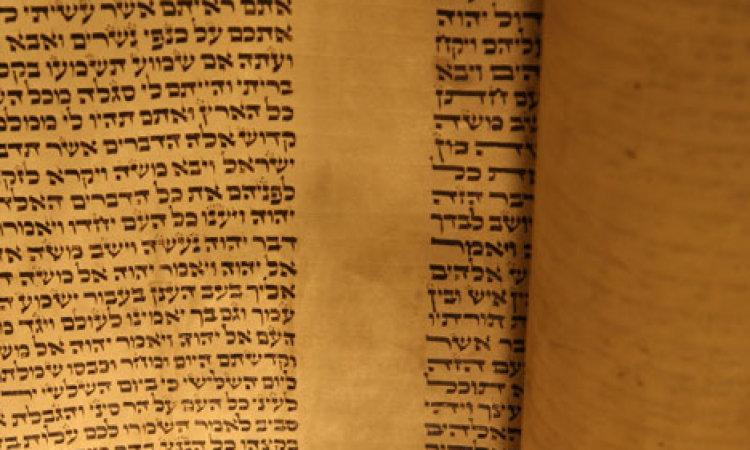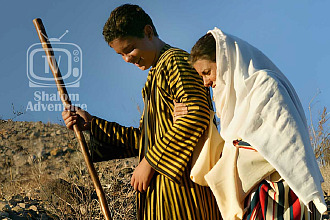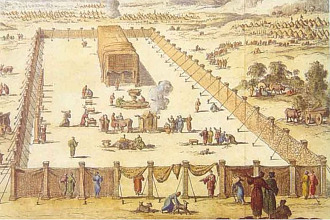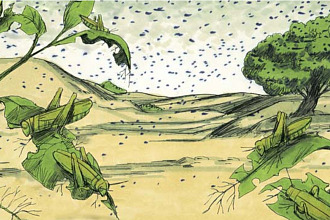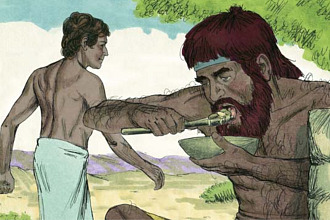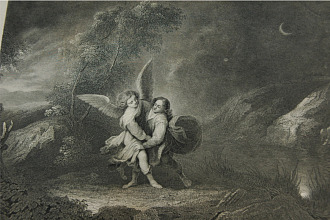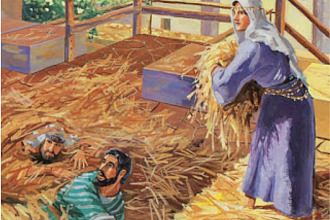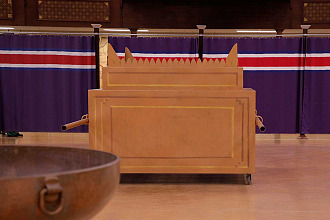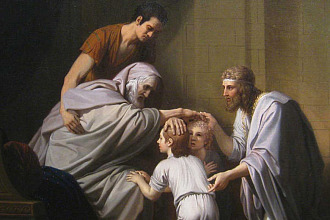Parasha for the Week: Ki-Tetzei Deuteronomy 21:10 - 25:19
Haftarah for the Week: Isaiah 54:1 - 54:10
Besorat Yeshua: Mark 7:24 - 37
Overview
The Torah describes the only permissible way a woman captured in battle may be married. If a man has two wives, and the less-favored wife bears a firstborn son, this son's right to inherit a double portion is protected over the father's desire to favor the child of the favored wife.
• The penalty for a rebellious son, who will degenerate into a monstrous criminal, is stoning.
• A body must not be left on the gallows overnight.
• Lost property must be returned. Men are not to wear women's clothing and vice versa.
• A mother bird may not be taken together with her eggs.
• A fence must be built around the roof of a house.
• It is forbidden to plant a mixture of seeds, to plow with an ox and a donkey together, or to combine wool and linen in a garment.
• A four-cornered garment must have twisted threads — tzitzit — on its corners.
• Laws regarding illicit relationships are detailed.
• When Israel goes to war, the camp must be governed by rules of spiritual purity.
• An escaped slave must not be returned to his master.
• Taking interest for lending is forbidden.
• Bnei Yisrael are not to make vows.
• A worker may eat of the fruit he is harvesting.
• Divorce and marriage are legislated.
• For the first year of marriage, a husband is exempt from the army to rejoice with his wife.
• Tools of labor may not be impounded, as this prevents the debtor from earning a living.
• The penalty for kidnapping for profit is death.
• Removal of the signs of the disease tzara'at is forbidden.
• Even for an overdue loan, the creditor must return the collateral daily if the debtor needs it.
• Workers' pay must not be delayed.
• The guilty may not be subjugated by punishing an innocent relative.
• Because of their vulnerability, converts and orphans have special rights of protection.
• The poor are to have a portion of the harvest.
• A court may impose lashes.
• An ox must not be muzzled while threshing.
• It is a mitzvah for a man to marry his brother's widow if the deceased left no offspring.
• Weights and measures must be accurate and used honestly.
• The parsha concludes with the mitzvah to erase the name of Amalek, for, in spite of knowing about the Exodus, they ambushed the Jewish people
"Don't Take the Mother Bird "
The Torah states, "If you happen to come across a bird's nest on the road or on any tree or on the ground, fledglings or eggs, and the mother bird is sitting on the fledglings or on the eggs, do not take the mother with the children" (Deuteronomy 22:6). Rabbi Yosef Chaim Zonnenfeld asked, "Can a person catch a bird once it is flying? Of course not! However, there are mother birds who are so concerned about the welfare of their children that they stay with them and do not leave them alone when a hunter comes along. Because of her devotion, the mother bird falls right into the hands of the hunter. It turns out that the hunter would want to take advantage of the mother's compassion for her children. Therefore, the Torah orders a person to send away the mother. One has no right to utilize her positive trait of mercy in order to capture her. All the more so, we should not try to take advantage of another person just because he is softhearted. There are people who are very compassionate and whenever they hear that someone has a difficulty, they do whatever they can to help. In monetary matters they do not like to argue or quarrel and easily give in to the demands and requests of others. Do not utilize their good naturedness to take advantage of them in either financial matters or in taking up their time and energy by asking them to do things that you would not ask others to do. The torah continues "You shall surely send away the mother bird, and the fledglings take for yourself, in order that it shall be good for you and you shall live a long life." (Deuteronomy 22:7) Why does the Torah promise a good and long life for fulfilling this mitzvah (commandment)? The Ramban explains that this mitzvah will implant in a person the attribute of empathy and compassion. Acting in a compassionate manner will enable you to feel empathy. Rabbi Sofer says: When someone empathizes strongly with the pain and suffering of others, he will suffer himself whenever he hears about the suffering of others, especially when he is unable to do anything to alleviate the other person's suffering, as is frequently the case. Therefore, after the Almighty commands us to have compassion on birds in order that we should grow in this trait, He guarantees that through this we will still live a good and long life. For many years you will be able to help a larger number of people and this will increase your days instead of shortening them. The more you feel for others, the more elevated you become.
"Amonites and Moabites"
The Torah states: "An Ammonite or a Moabite shall not enter into the assembly of God, even the tenth generation shall none belonging to them enter into the assembly of God forever. Because they did not meet you with bread and water in the way when you came forth out of Egypt." (Deuteronomy 23:4.5) Rabbi Shimon said that from here we see the punishment of those who withhold kindness. During the forty years that the Israelites spent in the desert they had manna from heaven and water from the well that went with them. In addition, protective clouds encircled them and journeyed before them. In short, they lacked nothing. Nevertheless, courtesy requires that if people come from a journey, they should be welcomed with food and drink. For failure to afford the Israelites this basic courtesy, the Ammonites and Moabites were banned from entering the assembly of the Almighty. From here we see the retribution of those who failed to show kindness to those who did not need it. How much greater will the punishment be for those who do not show kindness to someone who does require it? (Vayikra Rabbah 34:8). However we have an exception in the Bible, Ruth, ancestor of King David and the Mashiach was a Moabite. This shows us that even though G-d establishes general rules, his love is bigger than this rules and can recognize in everyone his son or daughter.
HAFTARAH Isaiah 54:1 - 54:10
This Shabbat is the fourth Shabbat after Tisha B'Av of the period called Shiva D'nechemta—"Seven weeks of comfort." The seven Haftarot of the weeks between Tish'a B'av and Rosh Hashana are prophesies of comfort and hope for Israel and God's people at large.
Haftara: "Sing, O barren one who did not bear; burst into song and shout, you who have not been in labor! For the children of the desolate woman will be more than the children of her that is married, says the LORD" (Is. 54:1). The text then continues to comfort the desolate woman: "Do not fear, for you will not be ashamed; do not be discouraged, for you will not suffer disgrace; for you will forget the shame of your youth... For your Maker is your husband... the Holy One of Israel is your Redeemer... For a brief moment I abandoned you, but with great compassion I will gather you... but with everlasting love I will have compassion on you, says the LORD, your Redeemer" (Is 54:2-8). "My covenant of peace shall not be removed, says the LORD, who has compassion on you... All your children shall be taught by the LORD, and great shall be the prosperity of your children. In righteousness you shall be established" (10-13).
Besorat Yeshua Mark 7:24 - 37
In our Parasha we have a list of laws that Moshe gives to Israel. In the Haftara we have great comfort for Israel who has been desolated and divorced but taken back by G-d as her husband.
Besora: "...a woman whose little daughter had an unclean spirit immediately heard about him, and she came and bowed down at his feet. Now the woman was a Gentile" (Mark 7:25-26). In the text she represents the openness of Yeshua for the Goyim (Gentiles). They were not very well considered in Israel. But Yeshua wants to teach his talmidim (disciples) about the needs of these people from the nations who are starving for spiritual food. This lady, as many other Gentiles, gave a demonstration of great faith. Yeshua said to her that the words of the L-rd are not for her as she is considered as a dog among the Jewish leaders. "He said to her, "Let the children be fed first, for it is not fair to take the children's food and throw it to the dogs"" (Mark 7:27). With great humility, she accepted her condition. "Sir, even the dogs under the table eat the children's crumbs" (28). Her faith amazed Yeshua. "For saying that, you may go—the demon has left your daughter" (29). She believed, she went back home, and discovered that her daughter was healed. Then Yeshua continued his ministry among the Gentiles. He was the first Rabbi to do so.

